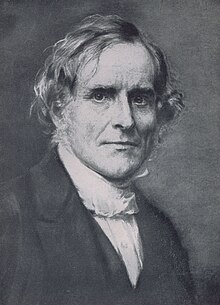F. D. Maurice
| Frederick Denison Maurice | |
|---|---|
 |
|
| Born |
29 August 1805 Normanston, Suffolk, England |
| Died | 1 April 1872 (aged 66) London |
| Occupation | Priest in Church of England, theologian, author, professor |
John Frederick Denison Maurice (29 August 1805 – 1 April 1872), often known as F. D. Maurice , was a major theologian of the Church of England, a prolific author and one of the founders of Christian Socialism. Since World War II, interest in Maurice has expanded.
John Frederick Denison Maurice was born in Normanton, Suffolk, on 29 August 1805, the only son of Michael Maurice and his wife, Priscilla. Michael Maurice was the evening preacher in a Unitarian chapel. Deaths in the family brought about changes in the family’s "religious convictions" and "vehement disagreement" between family members.
Maurice later wrote about these disagreements and their effect on him:
My father was a Unitarian minister. He wished me to be one also. He had a strong feeling against the English Church, and against Cambridge as well as Oxford. My elder sisters, and ultimately my mother, abandoned Unitarianism. But they continued to be Dissenters; they were not less, but some of them at least more, averse from the English Church than he was. I was much confused between the opposite opinions in our household. What would surprise many, I felt a drawing towards the anti-Unitarian side, not from any religious bias, but because Unitarianism seemed to my boyish logic incoherent and feeble.
Early education
Michael was "of no little learning" and gave his son his early education. The son "appears to have been an exemplary child, responsive to teaching and always dutiful. He read a good deal on his own account, but had little inclination for games. Serious and precocious, he even at this time harboured ambitions for a life of public service."
Higher education in civil law
For his higher education in civil law, Maurice entered Trinity College, Cambridge in 1823 that required no religious test for admissions though only members of the Established Church were eligible to obtain a degree. With John Sterling Maurice founded the Apostles' Club. He moved to Trinity Hall in 1825. In 1826, Maurice went to London to read for the bar and returned to Cambridge where he obtained a first class degree in civil law in 1827.
During the 1827–1830 break in his higher education, Maurice lived in London and Southampton. While in London, he contributed to the Westminster Review and made the acquaintance of John Stuart Mill. With Sterling he also edited the Athenaeum. The magazine did not pay and his father had lost money which entailed moving the family to a smaller house in Southampton and Maurice joined them. During his time in Southampton, Maurice rejected his earlier Unitarianism and decided to be ordained in the Church of England.
...
Wikipedia
